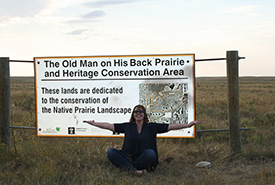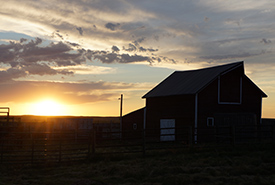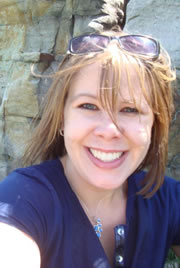The perfection of the morning at Old Man on His Back

Kailey Setter visits Old Man on his Back, Saskatchewan (Photo by NCC)
There is a peace that finds you on the open prairie. In that vast openness, worry and stress diffuse into the air around you, and your body regains equilibrium.
On this unexpectedly wild landscape filled with native grasses and endless sky, there is more room to breathe and everyday cares become, somehow, less important. You are fully present in your environment.
It was my on my first trip to the Nature Conservancy of Canada’s (NCC's) Old Man on His Back Prairie Heritage and Conservation Area (OMB) in southwest Saskatchewan that I realized somewhere along the way I had lost that equilibrium. I didn’t even realize I had lost it until I began to rediscover it.
In my day-to-day work I had become so caught up in trying to save the world that I had forgotten to just spend time in it with no agenda or schedule. On that first trip to OMB, I had the rare opportunity to slow down and truly connect with the landscape and the people around me, and I’ve been making my annual pilgrimage out there ever since.
That first year, I travelled seven hours from Calgary to take part in NCC's Conservation Volunteers weekend at OMB. One of my fondest memories on this inaugural trip is a surprisingly simple one — sitting on the verandah of the OMB interpretive centre with a coffee in my hand, watching the sun rise over the native prairie. The sun slowly turned the colour of the grass from grey to pink to gold — the perfection of the morning.
While living on what is now OMB with her husband Peter, Sharon Butala wrote a book by that very name, The Perfection of the Morning. Within the book’s pages she recounts how she married Peter and moved out to his ranch in the “extreme” southwest corner of Saskatchewan in the 1970s. The book is her meditation on what to her was a completely foreign landscape — but one she instantly fell in love with. It was a love that Peter and Sharon both shared.
“As the (native shortgrass prairie) disappeared,” Sharon recounts, “Peter was filled with regret. He would never allow a plow to touch his (land) if he could help it.”

Sunset at Old Man on his Back, Saskatchewan (Photo by NCC)
Today, the land on their ranch remains largely unbroken, and a keen eye can spot a diversity of native grasses, birds and wildlife. Pronghorn are regular visitors and I even spotted an American badger during my time out there.
In her book, Sharon philosophizes that an absence of contact with nature is the root cause of our modern day problems:
“Close proximity to a natural environment — being in nature — alters all of us in ways which remain pretty much unexplored, even undescribed in our culture. More and more I am coming to believe that our alienation from the natural world is at root of much that has gone so wrong in the modern world, and if Nature has anything to teach us at all, her first lesson is in humility.”
That feeling of humility is easy to come in a place such as OMB. This past month on my third trip to OMB, a group of us went for a drive into the prairie, away from the last remaining signs of human inhabitancy. We bounced over a dirt trail (which masquerades as a documented road on Google) out onto the land. Standing out in the middle of that great, seemingly empty yet infinitely full expanse, I felt a sense of smallness and wonder that I haven’t experienced anywhere else. It put things in perspective and reminded me that I am only on this planet for a short time.
In 1996, Sharon and Peter made arrangements with the Nature Conservancy of Canada and the Saskatchewan government to preserve their 13,088-acre (5,297-hectare) ranch forever. Today the area is home to a herd of genetically pure plains bison, reintroduced in 2003. To see plains bison on their historic grazing grounds for the first time in over a century was a sight beyond even Peter’s wildest dreams. Today, the ranch is largely as it was and always has been — an oasis of natural wonder.
As I sat in the truck, out in the open grassland on that truck trail, I thought about a specific line from Sharon’s book where she talks about the reasons she values her time spent in nature so much:
“It didn’t require a membership, social skills or specialized skills, companions, a vehicle, money, a weapon or even a special costume. All I had to do was open the door, pick a direction and start walking.”
We are all faced with many closed doors in life. The key is to take the time to open them, set our compasses for nature and start walking.
“The landscape is so huge our imaginations can’t contain it or outstrip it.” ~ Sharon Butala, The Perfection of the Morning


